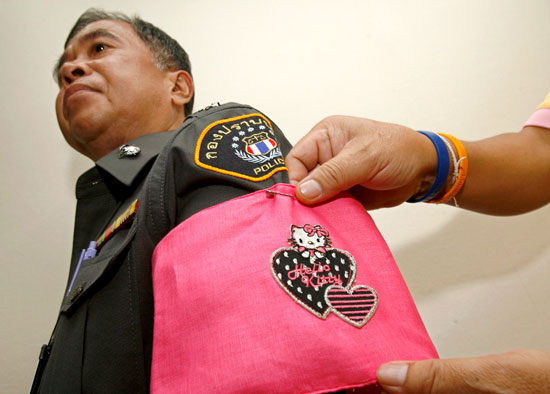The Pink-ish Scarlet Kitty

Hello Kitty, above, was created by the Japanese company Sanrio in 1974. She’s become an international sensation since; according to a New York Times article from May of 2010, the Hello Kitty brand is worth $5 billion a year. Originally intended for young children, Hello Kitty has branched out to dozens of different products and places — airplanes (as in, passenger jets); restaurants; televisions, both shows and the actual TVs themselves; toaster ovens and microwaves, and even “personal body massagers.” The end to where and on what her likeness will appear is endless.
Just ask some Thai police officers.
In 2007, a man named Pongpat Chayaphan became acting head of the Thailand’s Crime Suppression Unit, an intelligence agency. Chayaphan was a believer in the broken window theory promulgated by American researchers James Q. Wilson and George L. Kelling in 1982. The theory suggested that the aftermath of petty crimes (such as graffiti, litter, and, unsurprisingly, broken windows) acted as signals that crime was tolerated locally, and, therefore, more serious crimes would be as well. By greatly reducing petty crimes, Wilson and Kelling argued, the rate of more serious crimes would also drop. While there is a healthy amount of debate over whether the theory is correct, Chayaphan was a devotee.
So he started with his own little experiment.
Thai police have a checkered history of misconduct, ranging from minor items to extrajudicial killing and a laundry list of other ills. Believing that the broken window theory would help put an end to that, Chayphan focused on the minor, easily prevented violations. But when zero tolerance for petty infractions is your policy, you need a “punishment” which fits the “crimes” you’re aiming to stop. Chayaphan, per the New York Times, wanted to eliminate tardiness among his officers, as well as other bad habits such as littering and parking in someone else’s parking spot. Chayaphan told Reuters (as reported by the BBC) that his goal was to build discipline amongst his ranks, as this discipline would carry over to the rest of their jobs and, ultimately, to the crime rates in Thailand altogether. The punishment? Garish pink Hello Kitty armbands.

If an officer under Chayaphan’s command broke even the smallest of rules, they’d be subject to donning the armband — only in the office, thankfully, but for at least a day. The theory, per the AP, is that the armband would evoke feelings of guilt and shame by the person forced to wear it, disincentivizing them from committing these minor offenses a second time.
As of 2007, when the armband policy made the news, no one had yet committed an armband-able offense.
Bonus fact: In 2000, Singapore’s McDonald’s restaurants gave out Hello Kitty dolls adorned in wedding gowns. The promotion was so popular that people went to McDonald’s and bought more hamburgers than they’d intend to eat, discarding the meat to get the toys. Unfortunately, supply of the dolls didn’t quite reach demand, leading to a riot in one franchise. Due to the violence, area McDonald’s did something unheard of for a hamburger vendor — they limited the number of hamburgers that any one customer could purchase at a time.
From the Archives: False Arrest: The Czech Republic’s creative way to limit traffic accidents.
Related: All 62,581 Hello Kitty results on Amazon. (You may need to click “next” a few thousand times.) Surprisingly, they don’t seem to have the armband.
